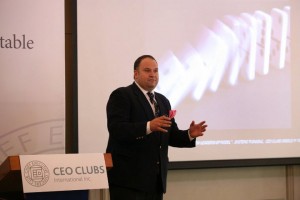 Most of the time, when people in Greece discuss the current situation, how we “lost the game” and got here, we tend to hear a variety of views.
Most of the time, when people in Greece discuss the current situation, how we “lost the game” and got here, we tend to hear a variety of views.
They range from international conspiracies to bureaucratic dysfunctional mechanisms, from corrupt politicians and public servants to inefficiencies in the general workforce and, lately, a variety of views on the “erroneous design” of the Eurozone or even Europe altogether. In doing so, we lose sight of the larger picture, within which the true answers lie; there is a known precondition to winning, and that is the need and determination to win, the so called “eye of the tiger.” Although this may sound profound, it has lately become seldom heard in this small part of the world. And therein lies the real root of the problem.
As a businessman and a consultant I have had the chance to speak with and interview a large number of professionals in Greece during the last 20 years. Sadly, I was constantly frustrated to witness the same pattern again and again; in a bizarre way, more and more people sought, sometimes even demanded, the rewards and prizes of true victory—but, and here is the kicker—they wanted these rewards without effort, without engaging to play, and without winning the game. This has been true both for entry-level professionals seeking their first job as well as for high-level management and “entrepreneurs,” the latter in quotation marks intentionally.
In countless interviews with young people looking for a job, I became horrified by two behaviors. Most of the time, these interviewees were only after the low-level motivational reward—money and perks. They neither saw any challenge in their work nor understood the need to invest in their experience or future advancement. In addition, these young people demanded unreasonably high remunerations from day one, before working and proving that they were worth it, an attitude that in modern Greek society has unfortunately become commonplace. Comfortably nestled in a pathogenic family system, they had the luxury to wait, complacently, for the “right” job opportunity that would grant them their demands. So reward was disconnected from effort, slowly resulting in sloth and indifference.
Even more shocking, however, was the observation that a large number of businesspeople also fell into the same trap. As the economy was booming, consumption skyrocketed and everybody was competing, looking for the “fast buck.” And “fast” in this case meant without sweating for it, without earning it, without planning for it or deserving it. In this line of thinking strategy was obviously optional, as was respect for and true relationships with customers and business partners. And slowly a lot of businesses also became indifferent and submerged in apathy. It is no wonder that productivity ratings in Greece showed a decline for a number of consecutive years.
But, as we know, all “good things” come to an end. For unless we identify and break deadly vicious cycles, such as those of sloth and gluttony, we will never regain our “eye of the tiger.” We will not be able, without it to make a great comeback as Rocky Balboa did, nor will the universe conspire to help us achieve what we want, as the writer Coelho suggests. And losing the eye of the tiger will result in losing—to those who have it.
ARTICLE BY ALEXANDER ATHANASSOULAS, BUSINESS PARTNERS MAGAZINE [AUGUST 2011]

